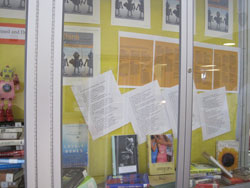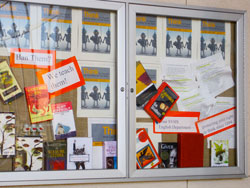Literature and Literacy/Secondary
CTC Standard 20: Instructional Leader
“Each candidate, through continuing personal involvement, demonstrates knowledge of traditional and contemporary literature for children and young adults. The candidate also demonstrates skill in individually and collaboratively preparing and implementing programs and activities which promote reading, listening, viewing and critical thinking skills for literacy and enjoyment of literature at all ages and stages of development.” (p.20)
I spent much of my youth in the library, so my stereotypes of school librarians were perhaps more positive than some students‘. School librarians were not just people with buns who shushed me, but my adolescent conceptions were perhaps equally inaccurate—I thought school librarians spent the whole day just finding books for students looking for something they might enjoy reading, maybe for a book report. In fact, in my observation and experience during my secondary placement, our secondary librarian is usually involved with research instruction and assistance, and is hoping for an increase in her hours which might allow her to develop more literature programs.
In my elementary section I mentioned the value of my SLIS education in Children’s Literature, but as a high school teacher my new knowledge of current Young Adult Literature has been even more valuable. In my time in the library, instead of falling back on adult books from my own reading which may sometimes work for students, I can now recommend literature focused closely on the needs and interests of specific students choosing books for pleasure reading or class assignments. As I plan to stay involved in the school library on a volunteer basis, I will be able to continue the work I have begun to develop more school–wide literary programs. I am determined to have a ‘Big Read’ at school next spring, and will continue discussions with interested students to begin a lunch-time book club.
Information literacy is the survival skill of the future, but I do feel the CTC document’’s inclusion of “ understanding of and ability to provide for the diverse needs of students and staff” reflects also the particularly instructional aspect of the Literature Competency. One of our middle school library technicians told me that she only buys what kids ask for. I had to wonder—how do they learn what to ask for?
Evidence
- 2.Literary Circles
These are photos of two displays I created for Banned Books Week—one in the library, and one in the courtyard of the English Dept. building. Locking the books up as forbidden proved to be an excellent device for increasing their circulation.



The document below contains all the handouts I developed for Literary Circles in a Junior Honors English class. My colleague had a long-term substitute, so she was happy to have me design a literary activity to share with her class once a week. The students clearly enjoyed the opportunity to choose their own novel for an English assignment. Sadly, if they chose modern novels they usually had to borrow them from the public library or buy them, as few new serious fiction titles have been added to our library in the last three years
